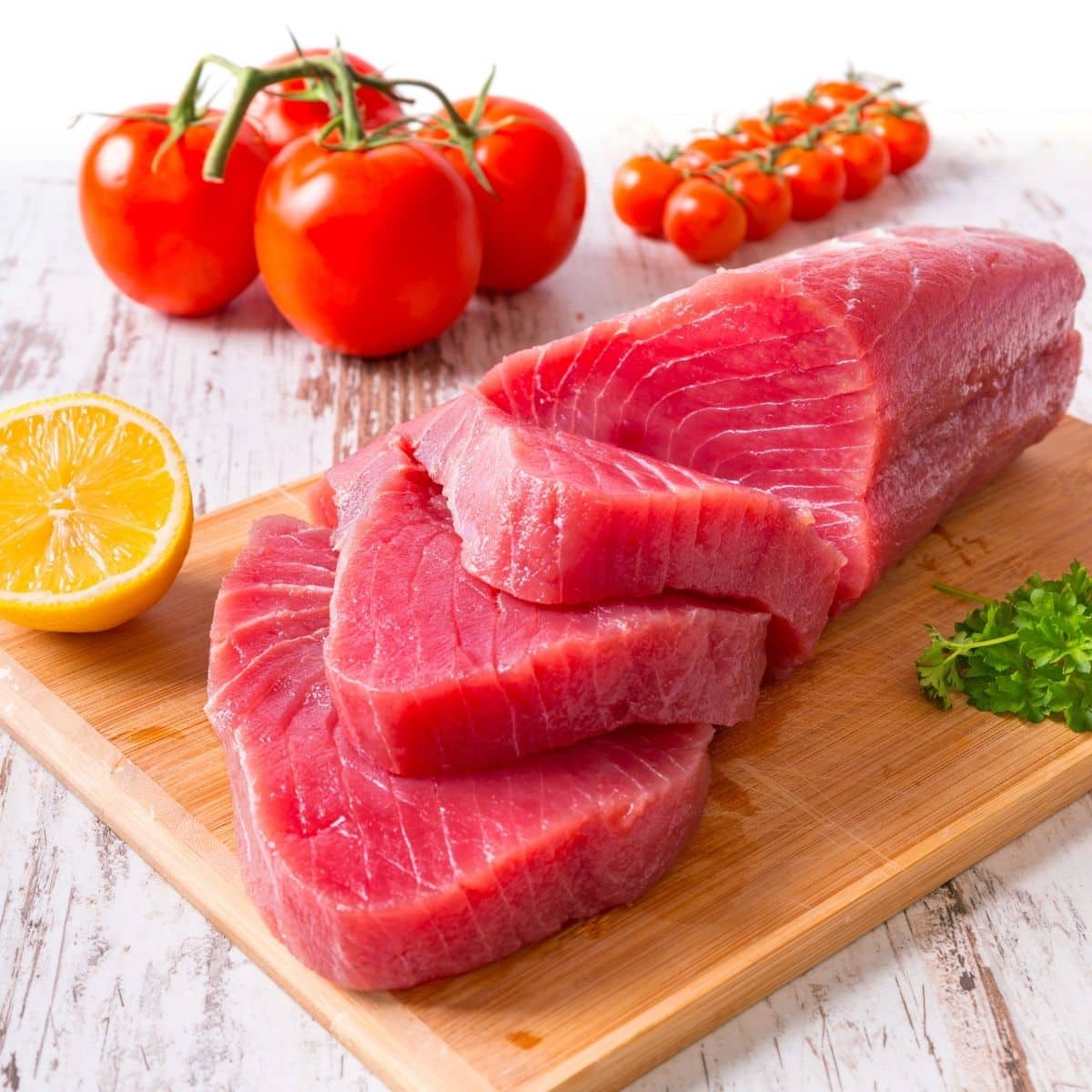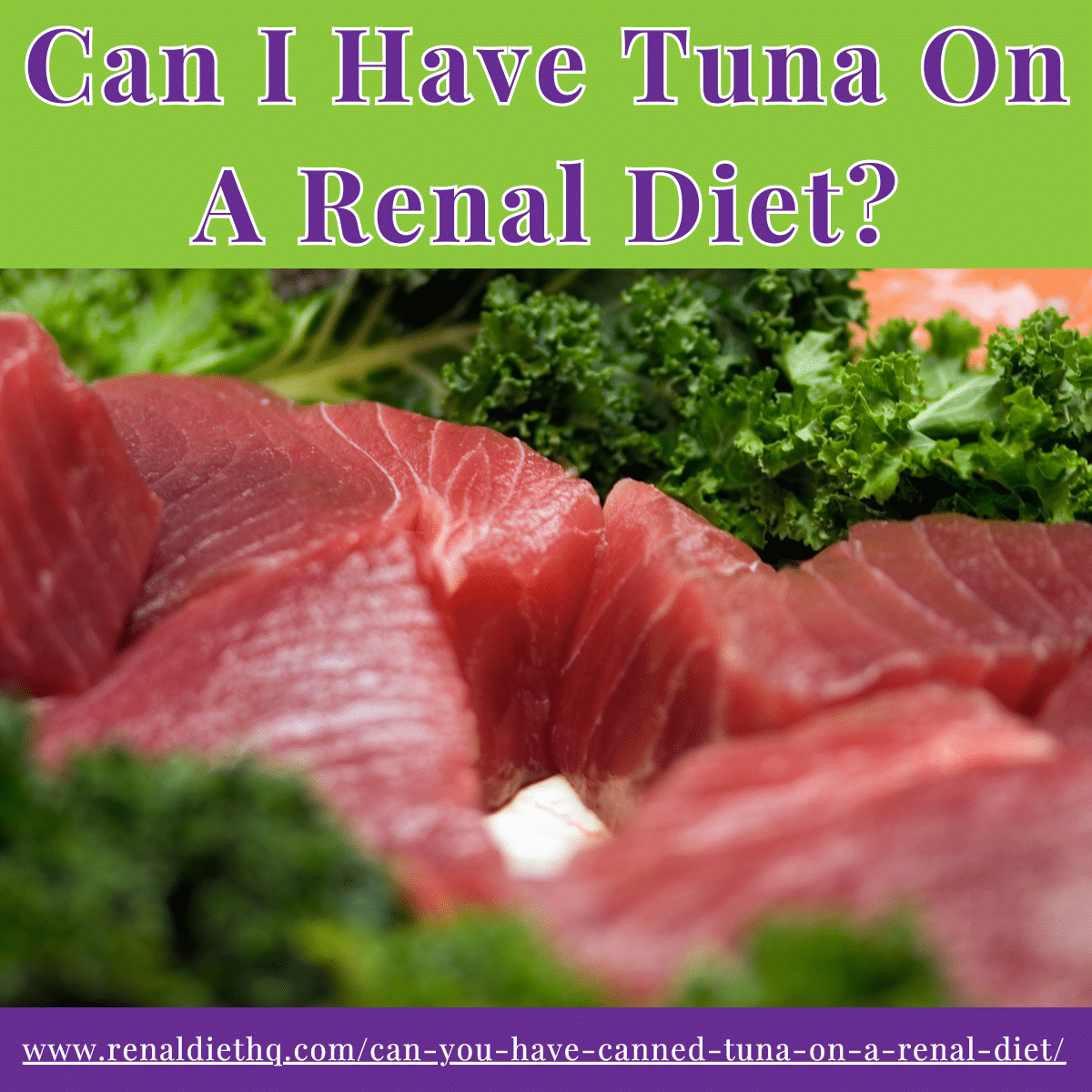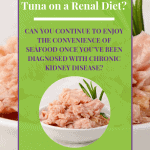Is Tuna Good For Kidney Disease?
Do you have a friend or family member who has been diagnosed with kidney disease? If so, you may be wondering what foods are best for them to eat. One food that is often recommended as part of following a low sodium kidney friendly diet for those suffering from kidney problems is tuna.
But can this seafood really help someone to deal with chronic kidney issues? In this article we will explore the health benefits and potential risks associated with eating tuna if you suffer from kidney damage.

At first glance, it appears that consuming tuna could provide some benefit to those with kidney issues. Tuna contains high levels of omega-3 fatty acids and protein, both of which are important components in any healthy diet – especially when managing serious changes like a renal failure diet.
Omega-3s are known to reduce inflammation in the body, while increased protein helps maintain muscle mass during times when your kidneys cannot process proteins as efficiently as they should.
But just because tuna might be beneficial doesn’t mean it should be eaten indiscriminately by those living with renal illness; there are also certain considerations one must take into account before including it in their kidney friendly dinner ideas.
We'll discuss these cautions more fully later on in this article - but suffice it to say that understanding how different types of tuna affect individuals differently is key to making sure that any consumption of this fish does not do more harm than good.
Jump to:
- Overview Of Tuna
- Nutritional Content Of Tuna
- Impact On Diabetes
- Protein And Potassium Content
- Sodium Content In Canned Tuna
- Dietary Considerations With Kidney Disease
- Health Benefits Of Eating Tuna
- Potential Dangers Of Eating Canned Tuna
- Safe Preparation Tips For Eating Tuna
- Alternative Fish Options For People With Kidney Disease
- Changes In Diet To Accommodate Kidney Disease Symptoms
- Effects Of Omega-3 Fatty Acids On Kidney Health
- Frequently Asked Questions
- Tuna Is Beneficial
For More Recipes and Ideas --->> Get Your Free Meals and Recipes That Are Perfect for Pre-Dialysis Diets, Pre-Dialysis with Diabetes, or Dialysis Diets.
Overview Of Tuna
Tuna is a popular, nutritious food that many people enjoy. It's an excellent source of protein and omega-3 fatty acids, which are important for health. However, its high sodium content can be problematic for those following a pre-dialysis renal diet.
Canned tuna generally contains more sodium than fresh or frozen varieties. The exact amount may vary depending on the brand and type of canned tuna purchased. When looking for any low sodium canned foods for CKD, it's important to read the nutrition label.
Nutrition labels provide information about the sodium content in tuna products. Some brands of canned tuna have as much as 200 milligrams of sodium per 2 ounces, while others have only 25 milligrams per 2 ounces. Additionally, it’s important to note that some types of canned tuna contain added salt or other seasonings that can further increase the total sodium content.
It's essential to carefully read nutrition labels when selecting any kinds of fish but especially when considering canned tuna due to its higher levels of sodium compared to fresh or frozen options. With this knowledge, individuals who must watch their intake of sodium can make better choices for their health needs. It's important to take the right steps to improve your kidney health. Next, we'll examine the nutritional benefits of tuna.
Nutritional Content Of Tuna
Tuna is a versatile fish, and its nutritional content reflects this. Like all seafood, it is high in protein, containing about 24g of protein per 100g portion size canned tuna. It's also low in saturated fats – just 1 gram for every 100 grams – making it an excellent choice for those looking to maintain heart health and improve kidney function through their diet.
Moreover, tuna contains generous amounts of various vitamins and minerals including omega-3 fatty acids and zinc, as well as potassium.
100 grams of tuna is equal to approximately 3.5 ounces of cooked, drained tuna. Some varieties of canned tuna contain added ingredients like oil or water, so the exact amount may vary slightly depending on the type of tuna you are consuming.
In terms of the macronutrients that make up our daily diets, tuna packs quite a punch:
- Protein - 24g /100g
- Fat - 6 g/100g
- Carbohydrates - 0 g/100g
- Potassium - 363 mg/100g
This nutrient profile makes tuna a great addition to any balanced meal plan – especially if you're living with kidney disease or other conditions where sodium intake needs to be monitored closely. The lack of carbs make it suitable for those on diabetic diets.
The high protein content also means your body will get all the amino acids it needs without having to rely too heavily on other animal products like red meat or eggs. Finally, there are many ways to enjoy tuna; whether raw (sushi), canned, smoked or cooked into casseroles and salads!
Impact On Diabetes
Tuna is an excellent choice for a kidney friendly diet for diabetics. It is low in fat and calories, making it an ideal source of protein to help manage weight gain associated with diabetes. Furthermore, tuna contains omega-3 fatty acids, which can reduce inflammation and improve blood sugar control in those with type 2 diabetes.
If you are considering adding tuna to your renal diabetic diet plan, here are some things to keep in mind -
- Look for canned light tuna packed in water rather than oil or brine solutions. This will limit the amount of added sodium that might otherwise be present.
- Watch how much tuna you consume as part of your overall meal plan; too much could lead to excess calories that may cause weight gain over time.
- If you are looking for ways to include even more healthy fats into your diet plan, consider pairing tuna with other sources such as olive oil or avocado when preparing meals.
In terms of its impact on diabetes specifically, research suggests that consuming fish like tuna two times a week can improve glycemic control and lower risk factors associated with heart disease among diabetics. Additionally, this same research found that consuming tuna was linked to improved insulin sensitivity - something beneficial for those who have difficulty controlling their blood glucose levels after eating carbohydrates.
When it comes to nutrition content, tuna is rich in protein and potassium – both essential nutrients for managing diabetes symptoms effectively. Many renal diabetic diet sample menus contain different types of fish, including tuna.

Protein And Potassium Content
Protein is essential for repairing tissue and maintaining muscle mass, which makes it an important nutrient for people suffering from kidney disease. Fortunately, canned tuna can provide plenty of protein - on average about 24 grams per 3.5-ounce serving. This means that eating just one can of tuna provides over half the daily recommended protein intake!
Potassium plays a key role in heart health and bone strength, so ensuring you get enough through your diet is crucial - particularly when dealing with kidney issues. Luckily, canned tuna offers up around 370 milligrams of potassium per 3.5 -ounce serving.
That said, some types of canned tuna may contain more than others due to added ingredients like brine or oil. Low potassium recipes may contain tuna in different amounts to provide protein without overdoing the potassium. Check out our tips for a low potassium diet if you need more info.
Sodium Content In Canned Tuna
Sodium content is also an essential factor to consider given its potential impact on hypertension levels. So how much sodium is in canned tuna? The answer varies depending on whether it is packed in water or oil.
Canned tuna packed in water typically contains around 200mg of sodium per 3-ounce serving, while those packed in oil contain approximately 400mg per 3-ounce serving. This means that individuals with kidney disease should opt for tuna packed in water if they have heightened concerns about their salt intake.
It's worth noting that regular consumption of canned tuna may not be suitable for some individuals because of its high sodium content if you are following a low sodium renal diet.
It’s important to note that even when selecting options low in sodium, dietary considerations with kidney disease must still be taken into account due to other nutrients such as phosphorus and potassium which can affect renal function.

Dietary Considerations With Kidney Disease
Navigating the dietary landscape with kidney disease can be a daunting task, but it doesn't have to feel like you're wandering through an impenetrable fog. So, is tuna good for kidney disease? Let's take a look!
First off, if you have chronic kidney disease (CKD) or end-stage renal disease (ESRD), it is wise to limit fish intake due to the potential of heavy metals such as mercury that could accumulate in your body over time. However, when consumed in moderation, certain types of fish – especially lower-mercury varieties like light canned tuna – may actually provide some health benefits for those with CKD or ESRD.
Tuna has been linked to improved cardiovascular health and reduced inflammation. It is also high in omega-3 fatty acids which help protect against various heart diseases.
In summary, eating light canned tuna on occasion can be part of your pre-dialysis diet restrictions; however always talk to your doctor before adding any food item into your regular routine. Now let's explore the many health benefits of consuming this versatile seafood dish!
Health Benefits Of Eating Tuna
Kidney disease can be a difficult condition to manage, and diet plays an important role in protecting kidney health. Fortunately, tuna is one of the foods that can provide some benefits for people with kidney disease, especially if you follow a dash diet for CKD.
Tuna’s high content of essential omega-3 fatty acids makes it a great source of nutrition for those with kidney disease who need more heart-healthy fats in their diets. Omega-3s help lower cholesterol levels and reduce inflammation throughout the body, both factors associated with improved renal function.
Additionally, studies have shown that consuming enough omega-3 fatty acids may even protect against chronic diseases like diabetes, hypertension, cancer and Alzheimer's Disease—all conditions commonly found alongside kidney dysfunction.
All these nutritional benefits make tuna an ideal choice for anyone seeking out better ways to improve their overall health and well being without sacrificing flavor or texture.
But before adding this tasty seafood into your meal plan there are potential dangers associated with eating canned tuna that should be considered too.

Potential Dangers Of Eating Canned Tuna
Before we all go out and stock up on tuna for dinner, let's take a closer look at the potential dangers of eating canned tuna. While it can be convenient and delicious, there are some things you should know before consuming this fishy snack.
First off, how much sodium is in a can of tuna? A single three-ounce can contains about 200 milligrams (mg) of sodium - that’s almost 10 percent of your recommended daily intake! Furthermore, if you opt for “light” or “low-sodium” varieties, they may still contain around 130 mg per serving. So while light canned tuna might seem like the healthier option, unfortunately that isn't necessarily true.
To make matters worse, many brands add preservatives to their products which also contributes to high levels of sodium in each can. If you add vegetables, whether fresh or canned vegetables for a CKD diet, you might get more sodium than you planned.
Mercury levels can also be a concern when it comes to eating tuna, as tuna is known to contain higher levels of mercury than other types of fish. High levels of mercury can be dangerous, as it is a neurotoxin that can cause long-term health issues.
To address this concern, it is important to be aware of the mercury levels in different types of tuna, as some fish contain more mercury than others. Light canned tuna, for example, generally contains much lower levels of mercury than albacore tuna. It is also important to limit the amount of tuna you consume, as larger fish tend to contain higher levels of mercury.
Additionally, it is important to look for tuna that is certified by the Marine Stewardship Council (MSC). This logo indicates that the tuna has been caught in a responsible way, and that it has been tested for mercury levels.
Finally, it is important to be aware of other sources of mercury, such as certain types of seafood and certain types of fish. If you cannot find tuna that has been tested for mercury levels, it is best to avoid certain types of fish altogether.
Safe Preparation Tips For Eating Tuna
Fortunately, canned tuna can still be enjoyed as long as the sodium content of the product is taken into account. Additionally, it's best to avoid eating raw or undercooked fish since this could potentially contain bacteria and parasites that may harm someone with weakened kidneys.
When preparing fresh tuna at home, make sure to cook thoroughly until its internal temperature reaches 145°F (62°C). This will help ensure any potential harmful contaminants are destroyed during cooking, as part of food safety for people with kidney disease. It's also important to note that while most types of tuna are safe for those with kidney issues, certain species like albacore should be avoided due to higher levels of mercury contamination in these varieties.
By following these simple guidelines when consuming tuna, people living with kidney disease can enjoy this nutritious seafood option without worrying about their health.
With careful selection and proper preparation techniques, individuals can reap the many benefits associated with eating tuna safely and effectively. Now let’s take a look at alternative fish options for people with kidney disease.
Alternative Fish Options For People With Kidney Disease
When considering what fish options are good for people with kidney disease, there are certain types of fish that provide more beneficial nutrients than others. For example, salmon is rich in omega-3 fatty acids which have been shown to reduce inflammation and improve heart health; while mackerel is an excellent source of protein without high levels of mercury or salt content like canned tuna often contains.
Additionally, herring and sardines are both low in fat but contain healthy fats such as EPA and DHA which support brain development.
In comparison to these healthier alternatives, tuna does not offer the same level of nutritional benefits since it tends to be higher in calories and saturated fat than most other types of seafood. Furthermore, because canned tuna typically includes added ingredients such as oil and salt, these additional components can increase fluid retention in those with pre-existing conditions such as kidney disease or diabetes.
Therefore when deciding on what type of fish to include in one’s diet it is important to consider the nutrient profile along with any potential side effects from consuming too much sodium or other unhealthy additives found in processed foods like canned tuna. Tuna is often used in potluck dishes, so you want to be certain you are creating a low sodium potluck dish if you are taking something to share.
Changes In Diet To Accommodate Kidney Disease Symptoms
Restricting certain foods and drinks can be a critical component in creating a meal plan for kidney disease. For this reason, many people with kidney conditions must consider their diet choices carefully. A can of tuna may provide high-quality protein for those living with the condition, but caution is required when it comes to sodium content .
It's important to note, however, that some varieties of tuna come packed with added flavors or seasonings that could increase the amount of sodium present even further. Before buying any canned fish product, make sure you read the nutritional label closely so you'll know exactly what you're getting.
With careful consideration and planning, it is possible for those dealing with kidney problems to still enjoy an occasional can of tuna as part of a balanced meal plan.
Effects Of Omega-3 Fatty Acids On Kidney Health
Omega-3 fatty acids are important for overall health, especially kidney health. They can reduce inflammation and may even slow down the progression of some chronic diseases like kidney disease. But does tuna have enough omega-3 fatty acids to make a difference? Let’s explore this further by looking at the nutritional content of tuna.
A 3 ounce portion of food contains approximately 16 grams of protein, 0 grams of carbohydrates, 5 grams of fat, 180 mg of sodium, 180 mg of potassium, 180 mg of phosphorus, and 0.3 grams of omega 3 fatty acids. This combination of nutrient values provides a balanced source of essential proteins and fats, with a moderate amount of sodium and potassium, to ensure that your body is supplied with the building blocks it needs for a healthy lifestyle.
The sodium, potassium, and phosphorus are all important minerals that help to regulate bodily functions, while the omega 3 fatty acids provide essential fatty acids to support healthy brain function.
This amount may be beneficial as it can help lower blood pressure levels while providing essential nutrients that are needed for healthy kidneys. Additionally, since protein helps maintain muscle mass and strength, having an adequate amount also ensures optimal functioning of your kidneys as they require energy to do their job properly.
Since omega-3 fatty acids play an important role in reducing inflammation associated with many chronic illnesses such as kidney disease, eating foods high in these fats could be beneficial for those suffering from this condition.
Tuna might not provide large amounts but its contribution should still be taken into account when creating a balanced diet plan tailored specifically towards supporting better kidney health and eating low phosphorus meats. Many people wonder if fish oil raises creatinine, but a combination of other sources such as fish oil supplements or walnuts will help increase daily intake significantly so consider adding them if possible too!
Frequently Asked Questions
Tuna is high in protein and low in phosphorus. Protein plays an essential role in maintaining healthy tissues, while phosphorus can build up in the blood of those with chronic kidney disease (CKD) and eating a renal diet. So by limiting phosphorus-rich foods like red meat and dairy products, eating more fish like tuna can help keep levels balanced. Additionally, tuna contains omega-3 fatty acids which have been found to improve cholesterol numbers and reduce inflammation associated with CKD.
In order to determine how much tuna is right for you, consulting with your healthcare team, like a renal dietitian, is recommended. They will help assess how far along your CKD has progressed and provide guidance around dietary modifications that are tailored to meet your specific needs. By doing this, they can ensure that you're getting enough nutrition without overloading your system with too many nutrients or toxins found in certain types of seafood. With their advice and support, including tuna in moderation as part of a well-balanced diet plan could potentially offer some positive benefits when living with kidney disease.
First and foremost, it’s important to note that if you have any kind of chronic condition like kidney disease, then consulting your doctor before making dietary changes is essential. With that said, here are some delicious and nutritious options:
* Seafood:
* Salmon * Anchovies * Mackerel
* Vegetarian Options:
* Lentils * Beans * Quinoa
Yes, quinoa is good for kidney disease. All three categories provide excellent sources of protein and other nutrients without being too hard on the kidneys. For example, salmon is an excellent source of omega-3 fatty acids which helps reduce inflammation in the body while beans contain fiber that can help maintain blood sugar levels. Additionally, mackerel provides plenty of iron as well as vitamins A and B12 which help keep energy levels up throughout the day.
When looking for alternatives to tuna for people with kidney disease, there's no shortage of delicious and nutritious options available. Finding something tasty isn't difficult at all – just make sure to check with your doctor first about any dietary restrictions or suggestions they may have!
First off, let’s look at nutrition. Canned tuna typically has more calories per serving as well as higher levels of omega-3 fatty acids which are beneficial for overall health. On the other hand, fresh tuna tends to have fewer calories but also contains less of these healthy fats. So when considering nutrition alone, there isn't necessarily one type of tuna that stands out above the rest.
When it comes to preparation methods though, things get a bit trickier. Since canned fish is already cooked before being put into cans, they tend to make simpler meal options compared to fresh fish. This can be helpful when dealing with limited kitchen resources or time constraints; however if you're looking for something closer to its natural state then fresh tuna might be the way to go.
It's also important to note that certain types of canned fish may contain preservatives like salt and oil which could potentially worsen symptoms associated with kidney disease depending on individual cases.
Here's a quick summary:
1. Nutritional value between canned and fresh tuna is comparable
2. Canned tuna provides easier meals while still containing some nutritious benefits
3. Fresh tuna offers more of its original state but requires cooking effort.
No matter what type of tuna you decide upon, it's always best practice talk through dietary choices with your healthcare provider first so they can tailor advice specifically for your needs!
When pregnant, it can seem like so much is off limits due to the health of both you and your baby. If you are also dealing with a kidney disease diagnosis, eating tuna may be an added concern. But fear not - there are some guidelines that can help make sure you eat safely while expecting.
First things first: what type of tuna should someone with kidney disease avoid? Canned tuna has higher levels of mercury than fresh tuna, which means that pregnant women and those with pre-existing conditions such as kidney disease should limit their canned intake. Fresh tuna, on the other hand, contains low amounts of mercury and is safe for general consumption in moderation.
So how much could someone with kidney disease safely consume? Experts recommend no more than two 6-ounce servings per week for adults who have healthy kidneys; however, if you have advanced stages of chronic kidney disease (CKD), it's best to consult with your doctor or dietitian before consuming any amount of seafood. They'll be able to give personalized advice based on your individual health concerns and dietary needs.
Tuna isn't just for sandwiches - by adding it into meals like casseroles, salads, and pastas, you can enjoy its deliciousness without having to worry about overdoing it. Want to make your own renal diet casserole recipes? Tuna works great in casserole dishes. Keep in mind that even though moderate portions are generally okay for people with CKD, too much fish might create further problems due to high phosphorus content found in most types of seafood. So play it safe - check in with your doctor before diving into a plate full of seafood!
When it comes to tuna specifically, there are several ways to prepare it to ensure maximum nutritional benefit without causing further damage to already weakened kidneys.
To begin, it's important to choose high quality canned or fresh tuna; these options generally contain fewer additives than processed varieties, which could negatively affect those with compromised renal function. It’s also essential to consider sodium levels since too much salt intake can worsen symptoms associated with kidney failure.
For those who have difficulty controlling sodium levels, limiting fish consumption may be necessary; however, if possible, here are some creative ideas for eating tuna:
* Baking Tuna:
* Stuffed Peppers - Stuff peppers with cooked brown rice, vegetables and canned tuna then top with grated cheese before baking.
* Fishcakes - Combine mashed potatoes, cooked veggies and flaked canned tuna then shape into patties before frying in a low-fat oil such as olive or sunflower seed oil until golden brown.
* Grilling/Barbecuing Tuna:
* Skewers - Alternate cubes of marinated raw tuna onto skewers alongside your favorite vegetables – onion slices, bell pepper pieces etc., – then grill over medium heat until just cooked through (about 3 minutes per side).
* Wraps - Grill pre-marinated raw tuna steaks wrapped in foil then serve inside warm tortillas along with lettuce leaves and sauces like tahini yogurt dressing.
No matter what cooking method you choose, always make sure that everything is thoroughly washed beforehand and that it's prepared using healthy ingredients such as herbs and spices rather than oils or fats which could increase overall fat content and cause complications related to heart health or renal diseases. With careful consideration of dietary guidelines combined with proper preparation techniques tailored towards individuals' specific needs, everyone can enjoy delicious meals featuring one of nature's most nutrient dense fishes!
Tuna Is Beneficial
Tuna can be beneficial for those with kidney disease, depending on how much is eaten and the type of tuna one consumes. For some people, canned tuna may be a better option than fresh tuna due to its lower levels of phosphorus and other minerals. However, pregnant women should avoid eating any kind of tuna if they are suffering from kidney disease.
The best way to ensure you are getting all the nutrition your body needs while still safely consuming tuna is to prepare it properly. This includes steaming or poaching rather than baking or frying as this will reduce the amount of fat in your meal. Additionally, make sure that you season your fish lightly so as not to overload your kidneys with salt or pepper. Or get some fresh tuna when dining out with kidney disease.
When consumed responsibly and in moderation, tuna can be an excellent source of protein for those who suffer from kidney disease. Eating well-prepared meals including fish such as tuna can help manage kidney health more effectively.





























Im stage 5 kidney disease and would like to do a tuna salad is that safe for me to do?
I would also like to see more information about kidney safe options especially for people with end stage renal failure. My husband says he feels sick after eating tuna and I always buy the ones with little to no sodium.
Wild Planet has no sodium tuna. Several other companies also have them. Bumble Bee has low sodium tuna. They are in the aisle where tuna is found.
What about Albacore tuna, tuna in oil, tuna in water. Feel more could be given on this topic. I haven't come across low salt or no salt added tuna. So I usually avoid it, and head for the Seafood dept. Tuna there is more expensive, but can be seasoned as you want. I just felt more confused, sorry. It's like tomatoes, they are high in potassium, yet they are in many Kidney diet Foods. We need better information out there, and like Diabetes, swaps for what we can't have that taste the same and has same texture. Thanks!!!!